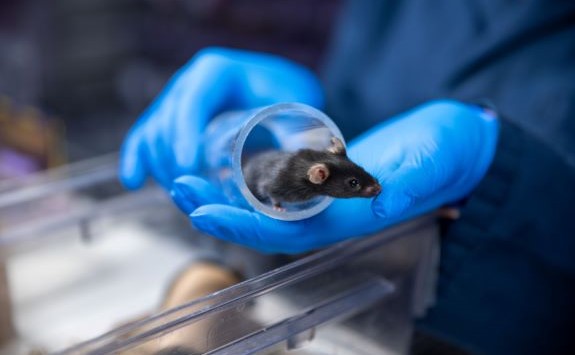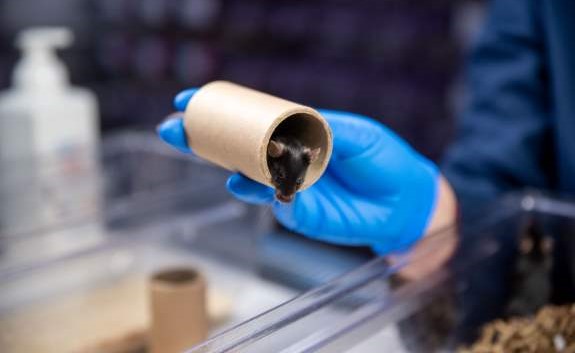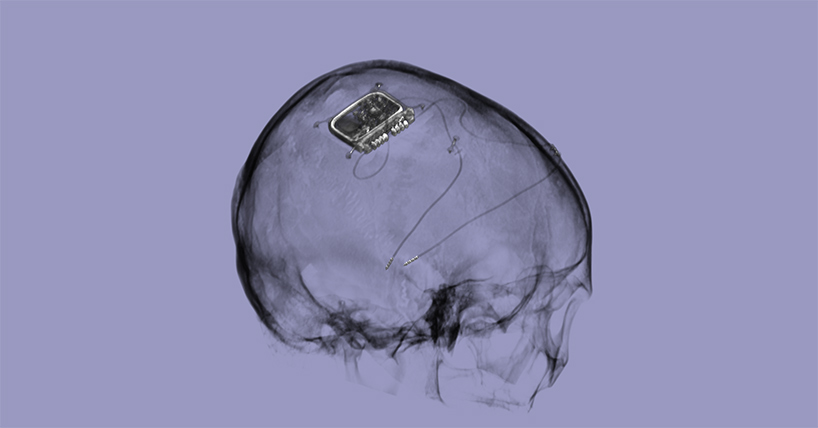Animals and Research
Animal research plays a vital role in developing our understanding of health and disease.
Research using animals has helped conquer many of the world's diseases and other health problems and is crucial to the fight against cancer, heart disease, diabetes and other conditions which are prevalent in the 21st century.
The vast majority of the medical research at Newcastle does not involve experiments on animals and the University is committed to the development of alternative methods, such as computer modelling, tissue culture, cell and molecular biology, and research with human subjects.
Research is also dedicated to understanding animal behaviour and improving the welfare and well-being of animals in different environments including laboratory, farm, companion of wild animals.
Newcastle University is a signatory of the national declaration on openness on animal research. and has been recognised as a Leader in Openness in Animal Research since the inception of the award in 2019.

Use of animals in research at Newcastle
To find out more about our research involving animals and animal welfare, visit the Centre for Behaviour and Evolution.
Animal research news
New £50m centre to develop brain stimulation device-based therapies
A new research centre involving Newcastle University experts aims to develop brain stimulation devices to treat conditions such as Parkinson’s disease, dementia, stroke and childhood epilepsy.
Team Newcastle take on Great North Run in aid of our students
This year, over 35 colleagues, graduates and supporters are joining #TeamNewcastle in the world’s biggest and best half-marathon to raise vital funds for our 29,000-strong student community.
New therapy to overcome treatment-resistant skin cancers
A study has revealed why some patients don’t respond to immune checkpoint blockade (ICB) therapy for solid cancer tumours and identifies a new combination treatment.
Animal Research Policy
Research using animals has made, and continues to make, a vital contribution to the understanding, treatment and cure of a range of major 21st century health problems including cancer, heart disease, diabetes and mental illness. While new methods have enabled scientists and medical researchers to reduce work involving animals, some work must continue for further fundamental advances to be made.
In addition to using animals in a small proportion of its medical research, the University is also dedicated to research that aims to increase our understanding of animal behaviour and welfare. This research provides novel solutions, particularly in the areas of conservation and welfare, which can then be applied to a range of farm, companion, wild and laboratory animals.

Newcastle University only uses animals in regulated research programmes (under the Animal Scientfic Procedures Act 1986) which are of the highest quality and where there are no alternatives. Much of this work is carried out under licences issued by the Home Secretary requiring the systematic weighing the potential benefits against the effects on the animals concerned. The University is committed to the principles of reduction, refinement and replacement in animal research; for each project it ensures that animal use is clearly justified (Replacement) that the number of animals used is appropriate for the scientific objectives (Reduction) and that procedures, care routines and husbandry are refined to maximise welfare (Refinement).
The University's Animal Welfare Ethical Review Body (AWERB) considers proposals for all activities that involve living animals (e.g. research, teaching and engagement activities). It includes lay representation and provides ethical advice on standards of animal care, welfare and accommodation. The University ensures that those working with animals are aware of their responsibilities and receive appropriate training. Veterinary and animal care staff are actively involved in the ethical review of research, welfare and care of animals. They provide ongoing advice and support to researchers where necessary.
For biomedical research, the University is committed to the development of alternative methods to using live animals such as computer modelling, tissue culture, cell and molecular biology, and research with human subjects. Procedures on animals are replaced with non-animal techniques wherever possible and this is reflected in the fact that the vast majority of biomedical research conducted at the University does not involve experiments on animals. Where the use of animals remains essential, the University applies high standards of a culture of care and respect for animal welfare.
Newcastle University is proud of its achievements in improving the welfare of laboratory animals, for which it has won national and international awards. The University is one of a small number of institutions that has active research programmes in this field and contributes to the development of further improvements in UK standards of laboratory animal care, which are already amongst the highest in the world. Examples include improving the detection and alleviation in pain and distress in a wide variety of species.
Find out more
- Our research involving animals and animal welfare: Centre for Behaviour and Evolution
- Statement of policy on collaborations with international institutions
- Home Office: research and testing using animals
- Understanding Animal Research
- National Centre for the Replacement, Refinement and Reduction of Animals in Research (NC3Rs)
Find out more
- Our research involving animals and animal welfare: Centre for Behaviour and Evolution
- Statement of policy on collaborations with international institutions
- Home Office: research and testing using animals
- Understanding Animal Research
- National Centre for the Replacement, Refinement and Reduction of Animals in Research (NC3Rs)



